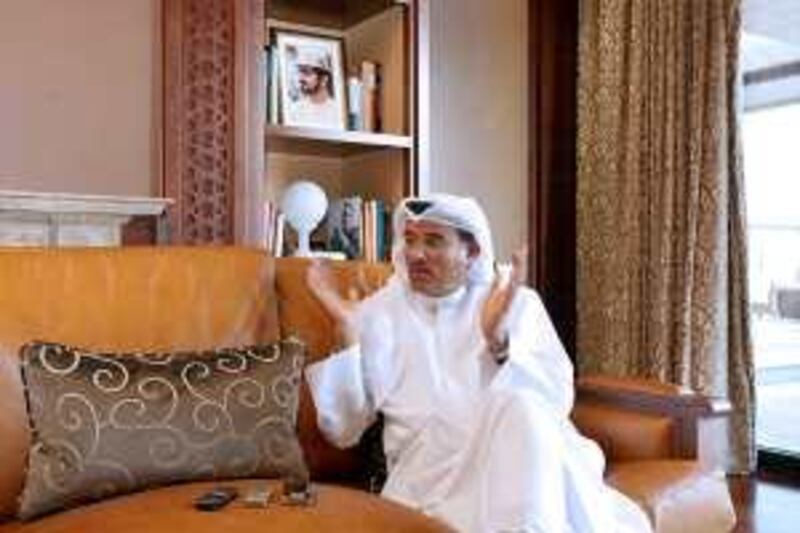DUBAI // Even after almost seven years of overseeing the US$1.5 billion (Dh5.51bn) construction of the world's tallest man-made structure, the Emaar Properties chairman Mohamed Alabbar still finds himself sneaking peeks at the finished product. "I'm like a child," he said, looking out from his office near the foot of the Burj Dubai. Visitors to the tower, he said, might even spot him standing among the crowds, looking upwards and marvelling. "I say, 'Oh my God. I can't believe we did this.'"
The Burj Dubai's scheduled opening today marks not only a record-setting triumph of engineering but a watershed in Dubai's whirlwind economic development. The building culminates an explosive, debt-fuelled tear of growth that was derailed by the global financial crisis, but not before establishing a once-sleepy port town as the pulsing, cosmopolitan centre of an increasingly dynamic region. "The opening of the building is a celebration, a symbol for the city that we're there. We're there to do business," Mr Alabbar said. "We are the regional hub and we're proud of it."
Few people have played so central a role in building modern Dubai as Mr Alabbar. One of a handful of technocrats entrusted with realising the vision of Sheikh Mohammed bin Rashid, the Vice President of the UAE and Ruler of Dubai, Mr Alabbar set up Dubai's Department of Economic Development in 1992. He went on to establish one of the region's largest companies and remains a director of Dubai 's powerful Executive Council.
In a wide-ranging discussion on the developments in Dubai leading up to the completion of the tower, Mr Alabbar conceded that mistakes had been made in the pursuit of growth. He added that the city has now achieved a level of development that means it will no longer need to borrow and spend at the pace it did before the global economic crisis. Dubai has struggled to cope with about $85bn of debt that could pose a long-term burden. However, the crisis also put an end to a speculative bubble that many executives say had become a costly diversion. With a restructuring now under way to make its debts more manageable, analysts and executives say Dubai can focus on returning to its roots as a logistics hub.
"There was a time when we all needed to fire all engines on," said Mr Alabbar. "Now I think we need to fire engines selectively, carefully." The executive drew much of Dubai's growth strategy from Singapore, where he lived and worked for five years. Singapore, he said, honed his business instincts and taught him about entrepreneurship, corporate discipline "and that profit is not a bad word". The city-state also impressed on Mr Alabbar how property development could be used to promote specific industries, that building office districts could lure banks and multinationals and that hotels would lure tourists.
After setting up Emaar in 1997, Mr Alabbar launched Dubai's property boom almost single-handedly in 1999 when Emaar began building Emirates Hills, the first large-scale development available for purchase by foreigners. Emaar first announced plans to build the world's tallest building in 2003. That the Burj's specifications remained a closely guarded secret, Mr Alabbar said, was in part due to the fact that they were in flux. Many design elements were changed along the way, even the height. So were the elevators, he said. After all 57 had been designed, Mr Alabbar looked at the mock-ups. "I said 'My God, it looks so horrible,'" he recalled. "Do we have time to change? It's so ? Gothic!" There were financial challenges as well. Contractors reportedly came close to walking off the job when Emaar fell behind on payments at the height of the economic downturn. Work to install the building's skin fell behind in early 2006 when the Swiss company responsible for the cladding failed.
The biggest challenges were related to the tower's height and the need to make life normal for the 100,000 people that will eventually live and work half a kilometre or higher in the air. There was, for example, what Mr Alabbar refers to as the pizza problem. Even in a building where the service elevators travel 32kph, designers were concerned tight security and great distances might keep food from getting delivered to the upper floors while it was still hot.
The solution? Emaar will run its own cash-on-delivery culinary courier service inside the Burj, Mr Alabbar said, paying for residents' food on delivery and then routing it to its destination inside the building. Inevitably, there will be critics who call the Burj an emblem of Dubai's excess, its hubris, a description Mr Alabbar dismissed. "The reality is that it's a reflection of the city's ambition," he said. "We go through ups and downs. That's natural." He dismissed speculation that his removal from the board of the Investment Corporation of Dubai was a political demotion. Sheikh Mohammed announced in November that Mr Alabbar and two other top executives, the Dubai World chairman Sultan bin Sulayem and the Dubai Holding chairman Mohammad Abdullah al Gergawi, were no longer on the board.
"We've never gone to any office," Mr Alabbar said of the board. "We had forgotten that it existed. I don't know how this speculation really got out of proportion." Mr Alabbar said that Dubai may have ultimately tried to grow too quickly. "We all know very well that we were a little bit too ambitious," he said. "If you look at all the landmarks that are built in London or in New York or in Hong Kong ? we want to do everything in five years," he said.
Mr Alabbar also suggested that the frenzied days of building out Dubai's infrastructure were at an end. "We were a hub under construction," he said. "It's time for us to really grow with substantial business because a lot of the construction is done." warnold@thenational.ae






